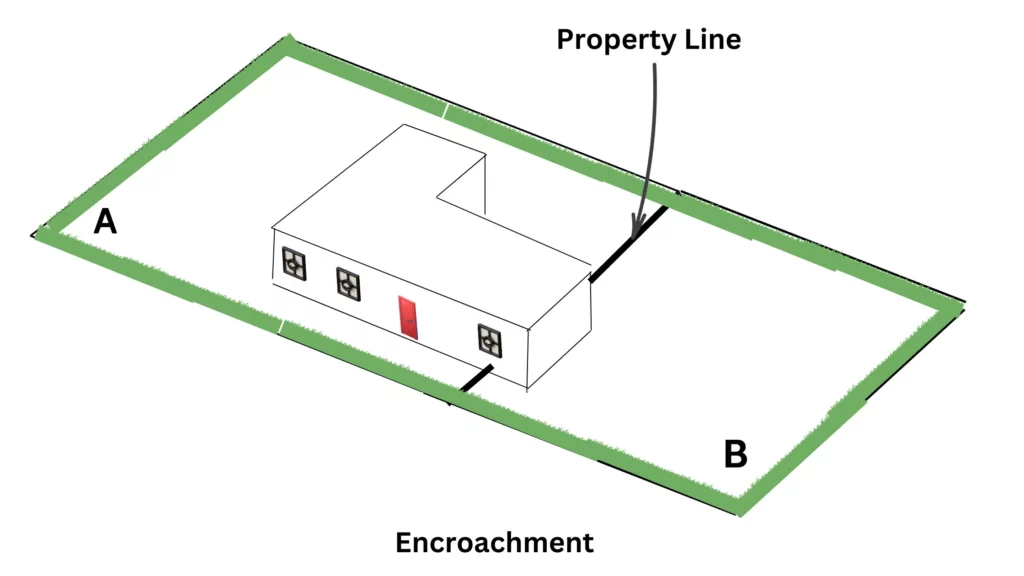Encroachment in real estate is when someone builds or extends onto a neighbor’s property without consent. It seems minor but can lead to legal issues, property damage, and sales complications.
The U.S. has lost over 140 million acres of farmland to encroachment, an area as large as Minnesota, North Dakota, and South Dakota combined. Over 31 million agricultural land has been permanently lost to urban expansion.
These figures highlight the urgent need to address and resolve the encroachment issue to preserve agricultural land and prevent future losses. A real estate attorney can help you handle and resolve these issues effectively.
What Is an Encroachment in Real Estate?

An encroachment in real estate occurs when someone builds on a neighbor’s property without permission. This could be a fence, driveway, or another structure. It can happen by mistake or on purpose.
Encroachments can disrupt your property lines, lower property values, and cause legal issues. Talk to your neighbor to remove or change the structure to resolve an encroachment. For more complex situations, seek help from a mediator or lawyer.
Types of Encroachments
Property encroachments vary in significance from minor to major and structural. Knowing these types helps you become a well-informed homeowner.
- Minor Encroachments: This includes small things like fences and gardens. You can move them easily, and they usually don’t affect the sale of a home much.
- Major Encroachments: These include the construction of a garage or house extension and overhanging tree branches.
- Structural Encroachment: This occurs when a property owner builds structures on land they do not own. It includes garages, sheds, or anything built on a street or sidewalk.
What Are the Problems of Encroachment?
Problems due to property encroachments can trigger a range of issues with significant consequences such as:
- Title Issues: Encroachments can complicate the legal title, making it hard to establish clear property lines.
- Lower Property Values: A buyer may be doubtful to invest in a property with encroachment issues. It may lead to decreased demand and lower sale prices.
- Legal Costs: Court cases for encroachment can be costly, it includes legal fees, court expenses, and possible compensation payouts.
What Are the Reasons Property Owners Encroach?
Know the common reasons why property owners encroach on neighboring lands:
- Financial Gain: Property owners encroach on neighbor’s land to gain financial benefits. These include expanding their usable space or access to resources in the encroached area.
- Boundary Confusion: Encroachment can occur when a property owner isn’t clear about the exact location of the property’s boundary. This confusion is due to inaccurate surveys or unclear property descriptions.
- Mistaken Assumptions: In a few cases, property owners may assume they have certain rights over a part of a neighboring property. This assumption might be due to verbal agreements, historical usage, or a misreading of property laws.
How to Deal With Encroaching?
When faced with encroachment issues, it’s crucial to understand your options. Here are steps to address it effectively.
- Know Your Grounds: You need to obtain surveys and review land records. These documents provide important information about property lines and help pinpoint any encroachment.
- Talk to the Encroacher: Talk to your neighbor about your concerns, especially if it’s a small issue like a tree branch. Assume it was an accident to keep the conversation friendly.
- Sell Your Land: Another option for homeowners is to sell the affected part of their land to their neighbor.
- File a Claim: If informal discussions fail, document the encroachment evidence and file a formal petition with the town selectman.
- Get Legal Counsel: Seek the advice of a qualified attorney. A counsel is a wise step especially if negotiations stall or the matter is complex.
- File a Lawsuit: Finally, to address the encroachment you need to take the matter to court and seek a judgment that favors you.
Encroachment vs. Easement
Encroachment and easement are common real estate terms for property use and access rights. Easement is an agreed-upon use while encroachment means unauthorized use.
Encroachment involves unauthorized construction on someone else’s land. Easements are the legal right to use another person’s land for purposes like access to a neighbor’s driveway or to install utility lines.
Special Considerations
You need to focus on legal details and available alternatives to handle encroachments. Consider the following:
- Local Laws Vary: Laws about encroachments differ by location. Local ordinances, state regulations, and neighborhood-specific rules influence these laws.
- Take Preventive Measures: You can get boundary surveys and document property lines to avoid these issues.
- Legal Advice is Essential: Consult an experienced attorney for tailored guidance to avoid encroachment.
Bottom Line
Encroachment in real estate can cause you legal issues and property damage. It happens when someone extends into their neighbor’s land without permission. To prevent it know your property boundaries, and keep official land records. Consult with a real estate lawyer can help you understand and solve these issues.
Frequently Asked Questions
What is a floodway encroachment?
A floodway encroachment is when structures or developments occur in an area designated for floodwater flow during floods.
What problems are caused by encroachment?
Encroachments can lead to disputes, lower property values, legal battles, limited property use, and financial burdens.
What is the most common type of encroachment?
The most common type of encroachment is unintentional encroachment due to boundary confusion or misunderstandings.
What is another word of encroachment?
There are different terms associated with encroachment, some of them being intrusion, trespass, invasion, or infringement.
















